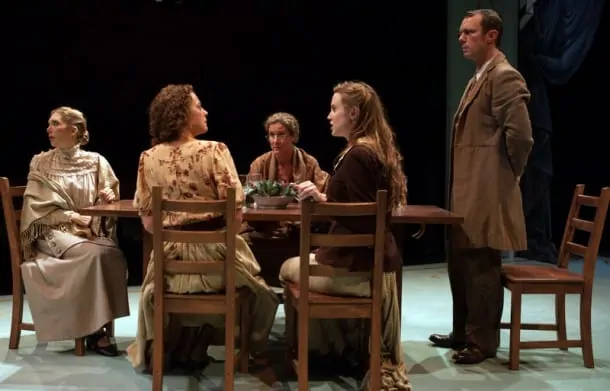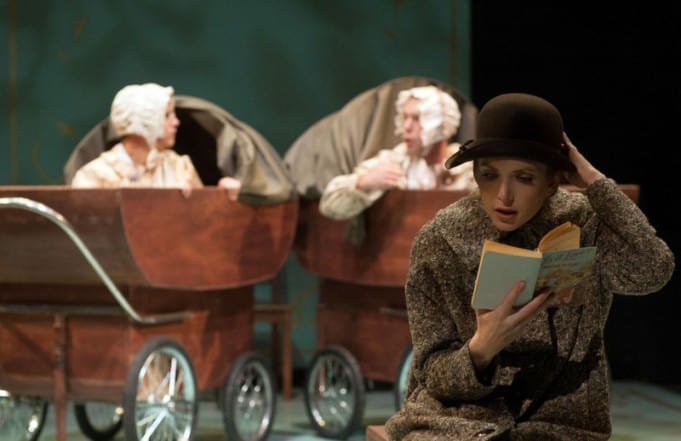“Wilder Times” opened recently at the Aurora Theatre in Berkeley. “Wilder,” of course refers to Thorton, author of “Our Town” and “Bridge of San Luis Rey.” “Wilder Tales” includes four of his one acts: “Infancy,” “Childhood,” “The Happy Journey to Trenton and Camden,” and “The Long Christmas Dinner.”
This production lived up to the Aurora’s high standards. The six-person cast performed admirably, particularly Stacy Ross. Costumes by Maggi Yule were an understated look back to the 1920’s. Clad in sensible shoes and clothing with tasteful lines, the actors brought ordinary conversation between ordinary people to life. Each play began with the full ensemble energetically singing a round of a well-known song as they moved onstage and off, arranging the minimalist set.
Like “Our Town” which focuses on the mundane, there’s no big dramatic drivers in these one acts. The first two examine unspoken tensions between parents and children. “Infancy” uses the device of an adult cast as an infant to explore the infant’s disgruntled and frustrated responses to the world. “Childhood” explores a fantasy journey taken by children sans parental units. The second two one acts examine the family at large. “The Happy Journey to Trenton and Camden” largely takes place in the family car as parents, accompanied by two children, travel to see a married daughter who has lost a baby. “The Long Christmas Dinner” shows same rituals repeated year after year to a changing cast of characters around the dinner table:

The catch here – and why I found “Wilder Times” tedious going – is that the autumnal pathos that informs “Our Town” is absent, and one is left merely with the mundane. Wilder can be very funny, but his humor here is kitschy or weird, instead of revealing. His attempts at profundity, such as the repetitious Christmas dinner, leave me feeling (in the words of Charles Isherwood) like a fidgety kid in need of an Adderall fix.
The most satisfying of these four was “The Happy Journey to Trenton and Camden.” This didn’t rely on talking babies, repetitious dinners, or fantasy trips to a parent-free world, but merely depicted a family trip back in the day when motoring was a big deal. Part of the success here was that the act involved motion – and the children’s enthusiasm was infectious.
Folks truly enamored by Thorton Wilder should catch “Wilder Times” before it closes on December 9th. Others, however, might want to hold off.



